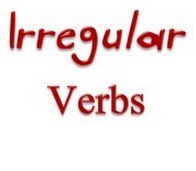Irregular Verbs Worksheet

Irregular Verbs Worksheet: Unlike regular past tense verbs, irregular past tense verbs don't end with the suffix -ed. In fact, irregular past tense verbs can end words in a number of different ways. By the way, all verb categories have five main types:
1. Infinitives: An infinitive is a verb form that is often introduced by the word 'to.' For instance, 'to smile,' 'to laugh.'
2. Simple Present: 'smiles,' 'laughs.'
3. Simple Past: 'smiled,' 'laughed.'
4. Past Participle: 'smiled,' 'laughed.'
5. Present Participle: 'smiling,' 'laughing.'
Irregular Verbs
Irregular verbs are quite different from regular verbs. Regular verbs are consistently ended with the suffix -ed. This principle applies equally to both simple past tense and past participles. In contrast, irregular verbs
can end a word in a diverse number of ways. For instance, for the verb 'swim,' we can have 'I swim,' 'I swam,' 'I swum.'
Students can sometimes confuse verb types when attempting irregular verbs in their writing. For instance in this written language example, the student has made several verb tense errors...
'The bird flyed quickly through the air. It become tired so it landed in a tree. It sleeped all day.'
In this example the student has had difficulty correctly identifying and using irregular past tense forms. If the student
were to use the Irregular past tense guide they would quickly discover that the spelling for each irregular verb type
for the problem verb varies. With a few simple changes to the irregular verbs, the writing passage sounds far better.
'The bird flew quickly through the air. It became tired so it landed in a tree. It slept all day.'
The irregular verbs worksheet below has a useful chart which your students can have beside them as they write. The guide charts a number of common irregular past tense verbs and the different spelling requirements for instance, when the verb changes from simple past to past participle, etc.
Irregular Verbs Worksheet...
Right-click to download this PDF file here.
References
Dykes, B. (1992) Grammar Made Easy Hale & Iremonger
Merrick, D (2009) Blake's Grammar Guide for Primary Students Pascal Press
Content Updated 07/2012
